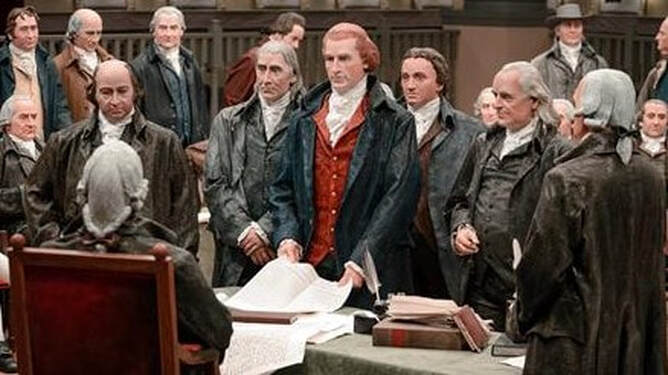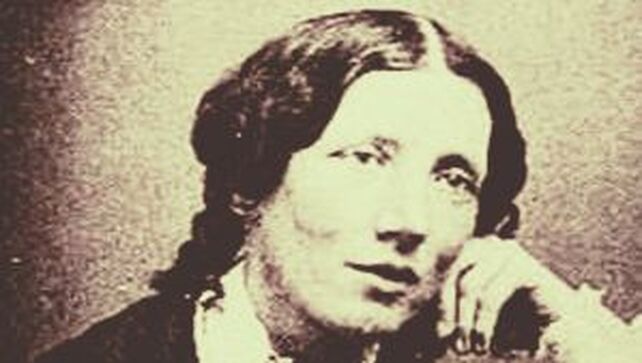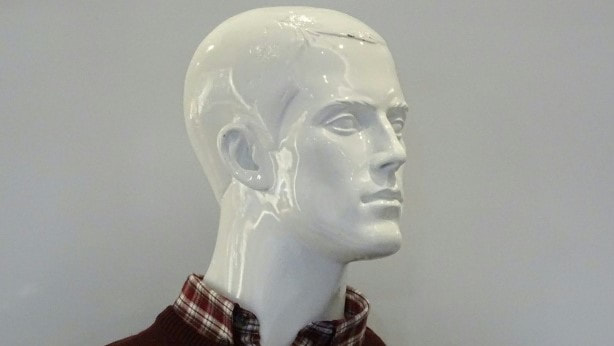|
A burden of being a serious and honest student of American history is living with an oppressive sense of decline. In integrity, wisdom, and achievement there is a chasm between even the lowest rank of Founding Fathers and our own crop of Presidential candidates, Congresspersons, Supreme Court Justices, Cabinet Secretaries, and generals. The Founders thought a lot about responsibility in government. They wanted the government to be the servant of the people rather than, as in the general pattern of history, the people be servants of the rulers. Able, accomplished, and responsible men, they resented an aristocracy of blood rather than merit. They had a long experience of dealing with colonial officials who often were lesser British politicians with no sympathy for the people they governed. Both State and federal constitutions of the Founding called for frequent elections so that politicians could not own offices. They knew they would return to the people and live under the laws they had passed. In the early House districts, Representatives could be known, at least by reputation, to the few thousands of citizens. They frequently published letters explaining their votes to their constituents. At the next election they might have to face rivals in debate before mass gatherings. The Founders knew that self-government by the people was a rare and vulnerable thing. It required “republican virtue” (strength of character and unselfish patriotism) to survive. Self-seeking of office was a suspicious ambition. One waited till called upon by the esteem of the people. This principle was true even in indirect elections like those for Senators and Presidential Electors. They could not conceive of a Senator who was not a widely and highly esteemed citizen and a valiant defender of his sovereign State. It was not until the 1830s that political party organisations gradually began to take control of candidates and elections, beginning in the more populous Northern States. In 1860 Lincoln proved that one could in some circumstances become President without achievement but by being a clever speaker and a shrewd handler of party machinery. Yet a degree of esteem and worthwhile public service was long still generally required for top positions. I can remember when candidates were expected to have wholesome family life and military service. Until the recent past, top officials were usually supposed to have some earned esteem based on genuine public service or private distinction of some kind. Look over the list of recent Presidential candidates and see who rises to that measure. Joe Biden may be the next president. What distinction or service does he have, other than being elected and re-elected from a rotten borough and appointed Vice-President. (One suspects that Obama appointed the weakest white man he could find as Vice-President to eliminate competition for future minority candidates.) What accomplishment graces the career of Hillary Clinton, who was almost elected President, other than marrying a previous President? Her medical plan in the first Bill Clinton administration was repudiated and her service as Secretary of State was disastrous. She has publicly expressed contempt and disdain for half the citizens of our country. Consider why more than half the same people voted for her. Can you imagine George W. Bush or any of his accomplices and handlers surviving five-minutes in a British House of Commons question session that requires real knowledge and competence? Yet Bush has not lost much standing for starting an illegal and disastrous war. Trump is said to be notably accomplished in business, but his standing seems to be based on his personality and promising anti-establishment policies that he had no hope and probably no intention of carrying out. In a genuine republic one is chosen for high office because he is esteemed. We are now in a position in which people are esteemed only because they held high offices. Take the case of General Colin Powell, the affirmative action appointee to every high office in the executive branch. This man lied to the public and the world to facilitate war crimes. Yet there is no loss of status but sympathy that he may have suffered in esteem from serving George W. Bush’s evil. You see what I mean?
4 Comments
Chief Magistrate Trump has proposed a National Garden to honour American heroes, with 39 names offered so far for statues. These lists are almost always a matter of taste and political expediency rather than sound historical judgment, but this one is very odd indeed. It seems to have been constructed so as to offer something to everybody (except, of course, Southerners). Like all such hacked together compromises it will not work. It sounds like it was written by Jared and Ivanka or some other in-house pseudo-intellectual. Where is the first black Supreme Court Justice, Thurgood Marshall? Where is the first black astronaut, whoever that was? Booker T. Washington? Why is he to be celebrated as a great American hero? Wasn’t he an Uncle Tom? We have also listed for honour Harriet Tubman, a darling of the latest fake history craze. Instead we ought to have heroes who really fought against slavery---Denmark Vesey, Nat Turner, John Brown. I understand Jackie Robinson, but what about Babe Ruth or Mickey Mantle? Ty Cobb is of course out as a Southerner. And Frederick Douglass too. Wasn’t he the fellow who called Lincoln “the white man’s President” who had no interest in the welfare of black folks? Harriet Beecher Stowe? It is obvious why she is included, but this third-string writer is the only representative of American literature. There should be Edgar Allan Poe and William Faulkner, but they are too Southern. At least they could have Hemingway or some representative Yankee writer. Melville and Hawthorne are out too. They were Northerners very lukewarm about Lincoln’s war. What about Elvis, probably the universally best known American of all time? If I had a vote, which ain’t gonna happen, I’d pick Hank Williams. I may be wrong but I don’t see any sodomites on the honours list. You could kill two birds with one stone by putting in Walt Whitman. Betsy Ross and Dolley Madison were great patriots but I don’t think they quite make the company of the greatest. I can provide a long list of real Revolutionary War heroes if anybody is interested: Patrick Henry, Francis Marion, Nathaniel Greene . . . How about adding the noble woman in Roe vs. Wade who made abortion a constitutional right? MacArthur but no Eisenhower? How about Churchill who was half-American, had a great impact on American history, and was greater figure than most of those on the list? Where is Lyndon Johnson who did more for civil rights than any other President, and also launched The Great Society which provides many thousands of well-paid no-real-work jobs for leftists? We have Joshua Chamberlain, a fine fellow and a worthy American gentleman, but why not somebody really important in the war against the South like U.S. Grant, who was also a great Civil Rights President? Or even better, William T. Sherman who inflicted great punishment on Southern women, children, black people, livestock, and private property in general? Curiously there are quite a few Southerners from early American history, Washington, Daniel Boone, Henry Clay, Davy Crockett, Thomas Jefferson, and James Madison. But these are great people whose Southernness has long ago been obscured to make them into honourary Yankees. Pseudo-intellectuals will never notice the Southern aspect. Why Amelia Earhart and not Will Rogers who was also important for things besides being lost in flight? At one time among the most beloved Americans. But he has a Southern tinge also and made fun of Yankees. And for modern Southerners, besides MLK: Audie Murphy, George S. Patton, Billy Graham, who can’t be pinned down by most people as Southerners although being Southern was vital to their greatness. I admit I had to look up Christa McAuliffe, but that is an OK choice, though certainly not the most important person among the astronauts. If we are recognising great or even important Americans, any knowledgeable person would have to include world-class figures like Calhoun, Davis and Lee. And Forrest, who both Lee and Sherman said was the greatest soldier in America’s central event. All in all, this is a trivial list---but perhaps because it is for a trivial people. I knew quite a few of them in my long academic career and gave the type the generic term Kevin. Kevins were moderately good-looking fellows of an Anglo-German type. The girls thought them attractive in an unthreatening, manageable way. They had an IQ a little above average but would never set the intellectual world on fire. They had no real vocation for or interest in any scholarly subject, but knew how to work themselves smoothly through a minimally acceptable performance for the Ph.D. Their goal was a career of prestige and leisure, unchallenged by any serious problems. Knowing and prospering in the system, Kevins, like any good Communist, certainly know and know how to spot deviationism to the right. This does not consist of any ideas or beliefs. It is an instinct for preserving the system and knowledge that attitudes to the right are always punished by the mainstream. Kevins are the corporals of the ruling elite. Their self-esteem and their living depends on thinking themselves wiser and more respectable than the personnel of the “deplorables” out of which they have often arisen. Make a Kevin the mayor of Minneapolis or Seattle, give them a crisis of rioting attributed to a leftist cause, and they are helpless. They can do nothing and have no thoughts except slogans. Seeing that it is expected of them they will kneel to the rioters. Identifying Kevin does not sufficiently explain all of the ruling establishment’s troops. There are real warriors who with malice aforethought want to destroy society. This is a type of the revolutionary who often appears in history and can be explained as a hater of mankind. Accounting for all the white female SJWs is another question entirely, of deep social significance and not yet fully understood. |
AuthorClyde Wilson is a distinguished Professor Emeritus of History at the University of South Carolina He is the author or editor of over thirty books and published over 600 articles, essays and reviews Archives
July 2024
|



